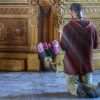The word of the day is “peculiar.” Nations and societies generally expect that those who live in them conform to their ways. But the faithful do not ultimately belong to any particular state or culture. The writer of 1 Peter proclaims, “You are a chosen generation, a royal priesthood, a holy nation, a peculiar people (KJV vs. 2:9). Our reading of 1 Peter 1:1-2; 10-12; 2: 6:10 teaches that we who have received the mercy of God should not try to fit in to the social order in which we live. Rather, we should live as God’s own peculiar people called to “proclaim the works of God” and shine His light in the darkness of this world.
Today we begin the reading of 1 Peter, traditionally ascribed to St. Peter. The Orthodox Study Bible notes that this epistle was written from Rome around 50-67 AD. Peter addressed it to those who are “pilgrims of the Dispersion,” the members of the churches of Asia Minor.
The Diaspora Applied to Christians
The “dispersion” initially referred to the diaspora, the scattering of the Jewish people throughout the Mediterranean world. This relocation of the Jews began with the destruction of the Northern Kingdom in 722 BC. It continued with the Babylonian exile of Jews from the Southern Kingdom in 587-537 A.D. However, in our reading, the “Dispersion” does not refer to the Jews. It refers to the spread of Christians of both Jewish and Gentile backgrounds throughout the Roman Empire. The apostle calls these believers, wherever they are, “pilgrims.” That is, they are “exiles” or “aliens” who are living in a strange place away from their homeland (Strong’s #3927, 193).
It is true that there was a flight of Christians from the Holy Land beginning with the stoning of Steven (Acts 7:57-59) in about 34 or 35 A.D. However, the apostle has in mind the broader reality that just as the Jews are now scattered throughout the Roman empire, so are Christians. This comparison supports the writer’s theme that the Church has inherited the right to be called the Chosen People.
An Identity Reassigned
In 1 Peter 9-10, Peter ascribes all the marks of the identity of the Chosen People of Israel to the Body of Christ. The apostle takes the words of 1 Peter 2:9 directly from Exodus 18:5-6 in the Septuagint (LXX) version of the Old Testament. In this passage, Moses proclaims that if the people keep the covenant, they shall be to Him a “royal priesthood and a holy nation” (18:6). Peter declares that the Almighty has conferred this sacred identity to the faithful.
Furthermore, the Book of Revelation expands the same thought, “to Him who loved us and washed us from our sins in His own blood and has made us kings and priests to His God and Father be glory…” (Revelation 1:10). In this view, the company of the faithful is a royal priesthood because it belongs to the Kingdom, and it shares the dignity and honor of the King. The role of this new kingly order of priests is to stand before the altar of God and offer spiritual sacrifices to Him (Strong’s #2406, 119).
The Orthodox Study Bible translates that those who are singled out to worship the Lord are “His own special people” (2 Peter 2:9). This understanding is also taken from Exodus 19: “If you will indeed obey my voice and keep My covenant, you shall be a special people to me above the nations (Exodus 19:5). In the same vein, the prophet Isaiah writes of “The people who I formed for myself, that they may declare my praise” (OSB Isaiah 43:21).
The Calling to Be Peculiar
The Greek word translated as “special” or “peculiar” refers to what one has obtained and kept for oneself (Strong’s #4047, 199). The Latin word peculium from which the English word “peculiar” comes gives an insight into what the surprising term means. The Latin refers to a persons’ private stash, his pocket-money. In this sense, we are “peculiar” because we are God’s own possession, kept only for Him.
Yes, we are peculiar. The Lord has called us to stand out among all the peoples and nations of the world. We are distinguished from others as light is different from darkness. And, as the Lord Jesus taught, we should not be ashamed to let the light given to us shine before others (Matthew 5:16). Moreover, in everything we do, we are to proclaim the praises of God among those who know neither God nor His works and ways.
How Are We Peculiar?
We are peculiar. What other society has the divine mandate to be “holy as God is holy” (1 Peter 1:13), that is, to be fully dedicated to the sacred? What other people has the vocation to be “no nation” but a community of love composed of members from all nations? What other association of persons has God told to renounce conformity to the ways of the world and to do His will alone (1 Peter 1:44)? Who else besides those who believe in Him has He redeemed with His precious blood (vs. 1 Peter 1:18)? To what other religion, society, or nation has He given the promise of an eternal inheritance kept in heaven for them (1 Peter 1:4)?
As the apostle writes in the verses that follow our reading, the Lord calls us to show our peculiarity by our good works. These deeds of love that will cause others to glorify God when Christ comes again (vs. 1 Peter 2:12). Moreover, the apostle says that we should do good in such a way as “to put to silence the ignorance of foolish men” (1 Peter 2:15). In short, unlike the rest of humanity, we are free in Christ. The pressure to conform to the ways of the society in which we live no longer need intimidate us. And our passions need no longer enslave us. But in Christ, we are free to serve the God who has chosen us to be His own, to serve, and to praise Him.
For Reflection
To be peculiar does not mean to be “eccentric” or “strange,” though there are those whom God calls to be “fools for Christ.” But for most of us, to be peculiar means that we have a God-given identity, as our discussion has shown. This insight challenges us with the question: How does our chosenness affect the way we live in this world? How can we dare to be more effective witnesses as the chosen “peculiar people” of God?

















